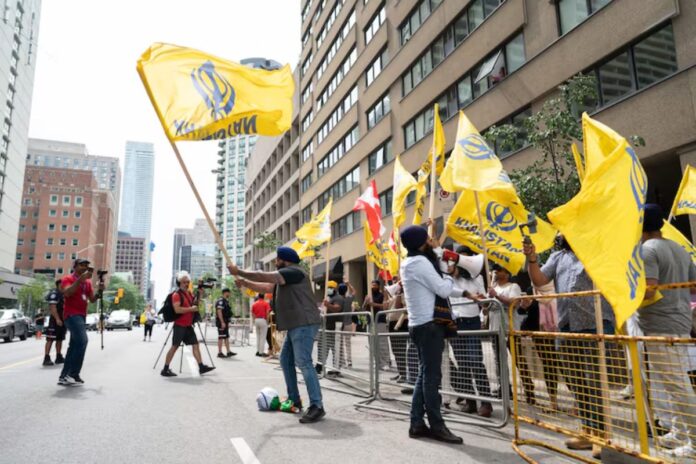Amid a growing diplomatic rift between India and Canada, a recent Canadian news report has stirred controversy by alleging that New Delhi denies visas to pro-Khalistani Canadians unless they renounce their separatist stance. The report, based on interviews with Sikh Canadians, including associates of the late Khalistani terrorist Hardeep Nijjar, has sparked a heated debate and drawn sharp criticism from geopolitical experts for its perceived irony.
The report alleges that Indian consulates in Canada require Khalistani sympathizers to sign declarations affirming their respect for India’s sovereignty and renouncing their support for separatism as a precondition for visa approval. Critics, however, have noted the inherent contradiction in the activists’ stance: while they openly disparage India and support separatist agendas, they simultaneously demand unqualified access to the country they denounce.
What the Report Claimed
According to the Global News report, several pro-Khalistani Canadians claimed they were asked to sign forms disavowing their separatist beliefs to obtain Indian visas. One notable case involves Bikramjit Singh Sandhar, former president of the Guru Nanak Gurdwara in Surrey, where Nijjar had served as chief until his death in June 2023.
Sandhar recounted that his visa application to attend a family event in 2016 was denied after Indian officials flagged his statements supporting Khalistan. Days later, he was reportedly asked to sign a form declaring India as his “mother country” and a “great democratic nation” while renouncing separatist activities. Sandhar refused, and his visa was not granted.
The report also alleged that other pro-Khalistani Sikhs received similar forms from Indian consular staff in Vancouver. Those who complied were reportedly granted entry to India.
Geopolitical Experts Respond
The report has prompted widespread reactions, with geopolitical experts and political commentators highlighting the paradox of the situation. Many pointed out that visa requirements often include similar declarations in countries worldwide and accused the Canadian media of overlooking this context.
Daniel Bordman, a well-known Canadian political analyst, offered a biting critique of the outrage. “Can you believe that India had the audacity to require a man who ran a temple glorifying mass-murdering terrorists to fill out a form denouncing terrorism before allowing him to enter? A form! He could have gotten carpal tunnel syndrome! Their cruelty has no limits,” Bordman said, mocking the indignation of the pro-Khalistani lobby.
Another geopolitical analyst on X (formerly Twitter) remarked that it is standard practice for countries to vet visa applicants to prevent security threats. “Every country asks such questions before granting visas. Don’t Canadian news outlets research properly before posting?” the analyst questioned.
Highlighting the Double Standards
Social media users also highlighted the double standards in Canada’s visa policies. One user noted that Indian military personnel applying for Canadian visas must disclose the locations of their service, whereas no equivalent scrutiny is applied to individuals with suspected terrorist affiliations. “They don’t require anything like this from terrorists,” the user commented.

Another pointed out that applicants for U.S. visas must submit details about their social media accounts, further emphasizing that India’s requirements are not unusual.
Underlying Irony and Debate
The irony at the heart of the controversy lies in the dichotomy of pro-Khalistani activists vehemently opposing India while simultaneously seeking to visit the country. Critics argue that requiring a declaration of allegiance to India’s sovereignty is a reasonable measure to ensure national security and respect for the nation’s integrity.
Furthermore, experts have pointed out that the report’s narrative feeds into a broader geopolitical context, where Canadian media often amplify allegations of Indian interference without adequate scrutiny. Some have suggested that Canada’s permissive stance on separatist activities has emboldened Khalistani elements, creating friction with India.
As the diplomatic spat continues, the debate underscores the complexities of balancing national security, freedom of expression, and international relations. For now, the row over visa policies serves as yet another flashpoint in the strained relationship between the two nations.

